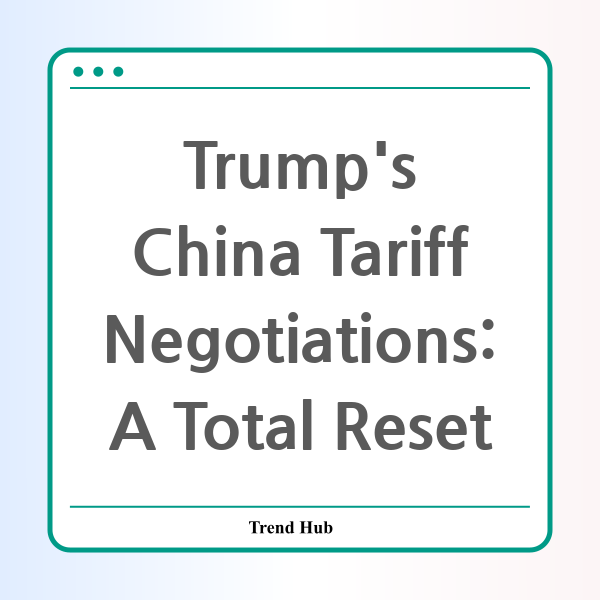* This website participates in the Amazon Affiliate Program and earns from qualifying purchases.

In a dramatic turn of events concerning U.S.-China trade relations, President Donald Trump has announced what he describes as a "total reset negotiated" during recent tariff discussions in Geneva. The president took to Truth Social to assert that significant progress was made in high-stakes talks aimed at resolving ongoing tariff disputes that have strained trade relations between the two countries.
The negotiations, which extended over ten hours, involved U.S. Treasury Secretary Scott Bessent and a Chinese delegation, focusing on various aspects of tariff imposition and export strategies. During the discussions, both sides explored possibilities to alleviate tensions and enhance trade, though no major breakthroughs were immediately reported.
Trump emphasized that many topics were discussed and substantial agreements were reached, reflecting a shift towards a more cooperative approach. He expressed optimism, stating that "great progress" had been made, and highlighted the importance of opening up China to American businesses for mutual benefit.
Historically, the U.S. has imposed tariffs on Chinese goods, significantly impacting trade dynamics. As recently as April, a 145% tariff was levied on certain imports, with the administration's broader strategy involving reciprocal tariffs affecting various goods. With this aggressive approach, the aim was to address the staggering trade deficit, which stood at over $1.2 trillion in 2024. The president's rhetoric suggests that he believes a fair deal could rectify this imbalance.
Secretary Bessent has also underscored the potential economic repercussions of the tariffs on China, citing estimates that these duties could lead to the loss of up to 10 million jobs within China. This statistic highlights the seriousness of the U.S. stance and the potential for significant economic ramifications should negotiations falter.
As the negotiations continue, both sides seem keen to reach a resolution that could benefit their respective economies. Trump has indicated that a favorable agreement could take shape if China responds positively to U.S. demands, especially regarding tariffs that have been a source of contention.
Understanding the dynamics of these negotiations is critical, as the outcome will have far-reaching implications not just for U.S.-China relations but also for global markets and international trade policies. With the stakes so high, it's clear that both nations are engaged in a delicate balancing act to find a common ground.
In conclusion, the recent discussions in Geneva represent a pivotal moment in U.S.-China trade relations. As both sides navigate this complex landscape, the potential for a new trade agreement could signal the start of a new era in economic cooperation, provided that both nations are willing to compromise and work towards mutual goals.
* This website participates in the Amazon Affiliate Program and earns from qualifying purchases.